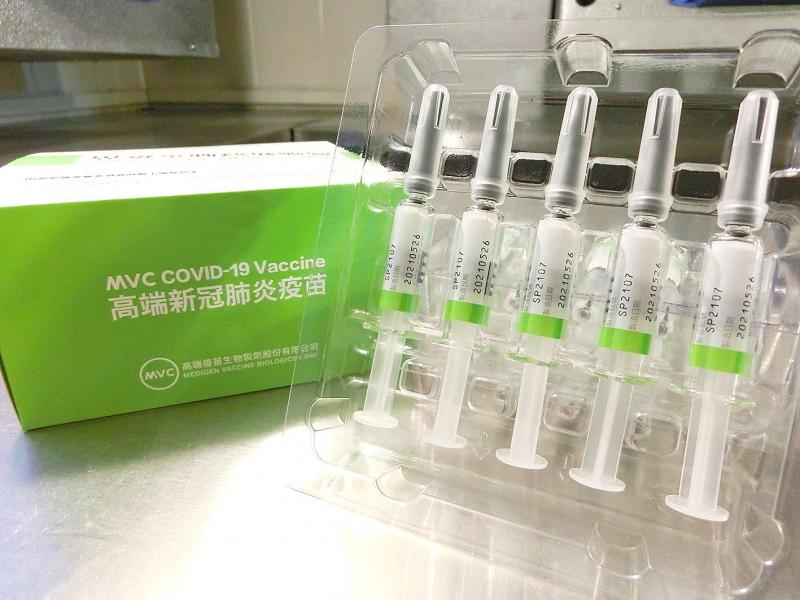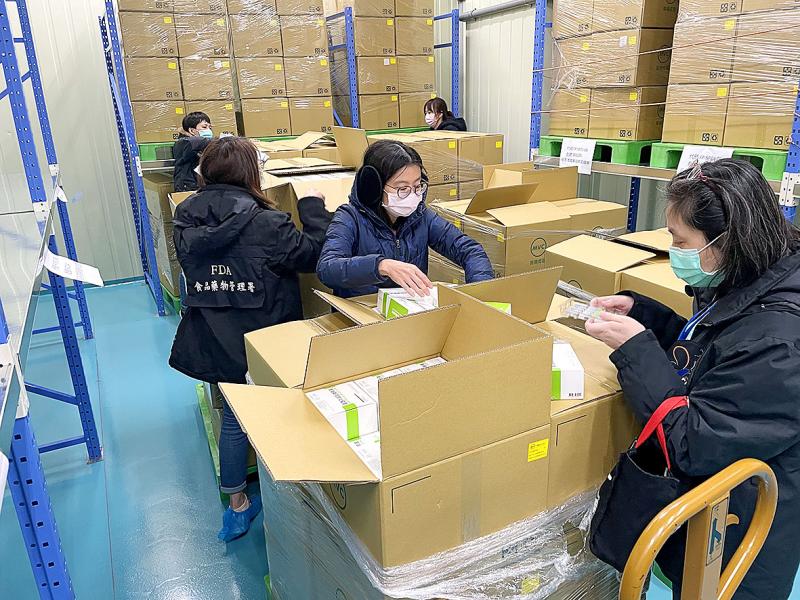Opening up the US Food and Drug Administration (FDA) or Centers for Disease Control (CDC) pages on vaccines for COVID-19 will teach a simple fact: Not a single COVID-19 vaccine currently in use has completed the formal US FDA approval process.
Instead, all vaccine approvals have been via an emergency use authorization (EUA) prior to completion of the Phase III data collection and analysis. The US permits manufacturers to present interim results for the Phase III process to gain approval. Indeed, the AstraZeneca vaccine, which flows through this writer’s veins, isn’t approved in the US at all.
Let that put in perspective the flow of Chinese Nationalist Party (KMT) attacks on Taiwan’s home-made Medigen Vaccine Biologic Corporation’s vaccine, developed in cooperation with the US National Institutes of Health (NIH).

Photo courtesy of the Food and Drug Administration
Last week it was the turn of former KMT vice chairman and Taipei mayor Hau Lung-bin (郝龍斌) to attack the government’s decision to approve the Medigen vaccine. Echoing attacks by other KMT politicians, Hau said that the government should not have approved a vaccine that has not completed its Phase III trials, even though at present no vaccine used in Taiwan had completed its Phase III trials when it was approved.
KMT officials even filed a lawsuit last month seeking to overturn the decision to give emergency approval to the Medigen vaccine because, it alleged, the approval process was “corrupt.” Hau and former health minister Yaung Chih-liang (楊志良) said that the vaccine should at least provide interim data, following the US standard.
Instead, the government used data derived from a technique called immunobridging, a technique not currently used in international vaccine approval. Under that technique, the vaccine had to produce antibodies in patients given the vaccine at a level equal to or exceeding the number produced by the AstraZeneca vaccine, and 50 percent of those receiving the vaccine had to seroconvert.

Photo courtesy of the Food and Drug Administration
According to Medigen and the government, the vaccine was at least as good as the AZ vaccine in antibody levels, and 99.8 percent of recipients seroconverted (produced antibodies). No serious side effects occurred. Medigen has since secured approval for a small Phase III study in Paraguay.
KMT members have also claimed that the company’s production of a small amount of the vaccine prior to approval showed that it knew the vaccine would be approved and the process was thus rigged.
Explain, anyone, how a vaccine can undergo further testing without being produced.
It seems logically obvious that a vaccine that produces levels of antibodies comparable to those of existing vaccines is a good vaccine, which is why European Union regulators are leaning toward accepting immunobridging as a valid test of a vaccine’s efficacy, according to Taiwanese health officials. The US FDA is still discussing the issue, but has not responded negatively to its use.
It is amusing to contemplate what the KMT would be saying about the Medigen vaccine had its candidate Han Kuo-yu (韓國瑜) been elected, and to highlight the hypocrisy of a longtime authoritarian party demanding transparency from the government. It is also easy to dismiss the KMT moves as mere electoral grandstanding and the usual reflexive attacks on the decisions of the Democratic Progressive Party (DPP).
But, as Taiwan’s recent Olympic successes show, whenever Taiwan shines on the world stage, Taiwan identity is strengthened, the nation’s hunger for recognition increases, and its profile on the world stage rises. This helps Taiwan secure sympathy and support for its de facto independence and opposition to China’s drive to annex the island.
All of these are anathema to the pro-China KMT. It is important to understand this: the KMT is attacking the Medigen vaccine not only because the DPP oversaw its approval but also because it is a Taiwan-made vaccine.
Imagine the global response to Taiwan if a useful and reliable vaccine against COVID-19 was produced right here in Taiwan. Our profile would skyrocket. (There could well be two such vaccines, since another firm is also working on one, though it is not as far along in the process as Medigen.)
Think of the diplomatic uses of such a vaccine, how donations of it to developing countries would help Taiwan, again raising its profile with potential “diplomatic allies” and increasing global support for its de facto independence.
Vaccine diplomacy from Taiwan would be a positive counter to China’s vaccine diplomacy, especially given the growing problems with the Sinovac vaccine. It could also be used in conjunction with the foreign policy of other Taiwan-supporting states.
Headlines which read “The US secures 500K doses of Taiwan’s Medigen vaccine for Africa” or “Japan purchases 1 million doses of Medigen for donation to developing countries” would be very good, not only for Taiwan’s status in the world, but also for its health industry exports.
Of course, once the noise dies down and the efficacy of the Medigen vaccine is demonstrated in use, it will gradually dawn on Taiwanese that they have done what only a tiny handful of countries have done: created an effective vaccine against COVID-19. That by itself will be a source of immense pride to locals, and will reinforce the Taiwanese identity.
Both the heightened sense of Taiwanese identity, and the practical success of a working vaccine, will bolster the DPP at the ballot box. That too is anathema to the KMT.
Readers will recall that the KMT originally advocated importing Chinese vaccines. One reason for the sustained attacks on locally-made vaccines is to divert public attention from the fact that the Chinese vaccines, the KMT’s original vaccine of choice, are globally seen as inferior. Where would the KMT be if Taiwan produced a better vaccine than Sinovac?
The attack on the Taiwan-made vaccine by the pro-China KMT is a signal that the vaccine in all probability will work, that what the KMT fears is not its failure but its success. If the vaccine did not work and regulators and the DPP were promoting it in spite of that, the KMT would be taking a different tack. It would be citing the data, rather than attacking the approval process itself, simply making the corruption obvious.
Looked at in that light, the KMT attack is an accusation that the DPP is so crazed and corrupt that it would foist a useless vaccine on the public (and that somehow it has compelled the entire medical approval apparatus to go along with that move), and that the DPP is so blind it can’t see the political effect of such a failure on its electoral prospects.
That is obvious nonsense.
Medigen, incidentally, has been working on a dengue vaccine since 2015. Such a vaccine could also raise Taiwan’s profile, especially in tropical areas where the disease is endemic. A Phase II trial was completed last year, and the company is working on conducting Phase III trials.
Let us hope that when that vaccine is finally approved, the KMT has the decency to take pride in the accomplishments of Taiwan’s medical researchers.
Notes from Central Taiwan is a column written by long-term resident Michael Turton, who provides incisive commentary informed by three decades of living in and writing about his adoptive country. The views expressed here are his own.

April 14 to April 20 In March 1947, Sising Katadrepan urged the government to drop the “high mountain people” (高山族) designation for Indigenous Taiwanese and refer to them as “Taiwan people” (台灣族). He considered the term derogatory, arguing that it made them sound like animals. The Taiwan Provincial Government agreed to stop using the term, stating that Indigenous Taiwanese suffered all sorts of discrimination and oppression under the Japanese and were forced to live in the mountains as outsiders to society. Now, under the new regime, they would be seen as equals, thus they should be henceforth

Last week, the the National Immigration Agency (NIA) told the legislature that more than 10,000 naturalized Taiwanese citizens from the People’s Republic of China (PRC) risked having their citizenship revoked if they failed to provide proof that they had renounced their Chinese household registration within the next three months. Renunciation is required under the Act Governing Relations Between the People of the Taiwan Area and the Mainland Area (臺灣地區與大陸地區人民關係條例), as amended in 2004, though it was only a legal requirement after 2000. Prior to that, it had been only an administrative requirement since the Nationality Act (國籍法) was established in

Three big changes have transformed the landscape of Taiwan’s local patronage factions: Increasing Democratic Progressive Party (DPP) involvement, rising new factions and the Chinese Nationalist Party’s (KMT) significantly weakened control. GREEN FACTIONS It is said that “south of the Zhuoshui River (濁水溪), there is no blue-green divide,” meaning that from Yunlin County south there is no difference between KMT and DPP politicians. This is not always true, but there is more than a grain of truth to it. Traditionally, DPP factions are viewed as national entities, with their primary function to secure plum positions in the party and government. This is not unusual

The other day, a friend decided to playfully name our individual roles within the group: planner, emotional support, and so on. I was the fault-finder — or, as she put it, “the grumpy teenager” — who points out problems, but doesn’t suggest alternatives. She was only kidding around, but she struck at an insecurity I have: that I’m unacceptably, intolerably negative. My first instinct is to stress-test ideas for potential flaws. This critical tendency serves me well professionally, and feels true to who I am. If I don’t enjoy a film, for example, I don’t swallow my opinion. But I sometimes worry